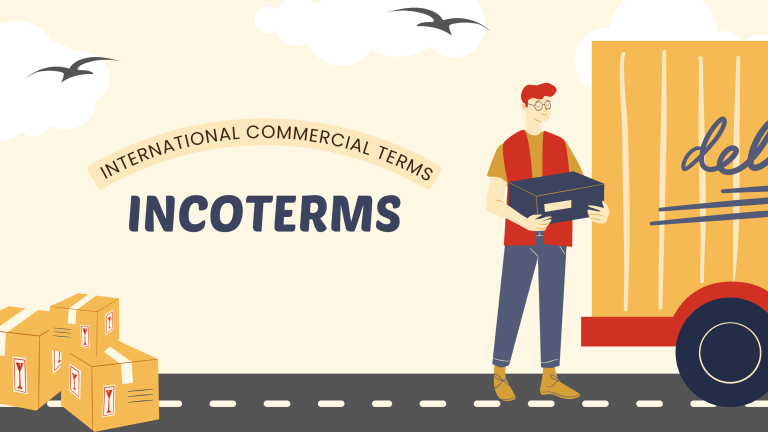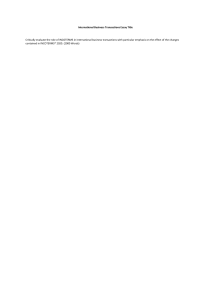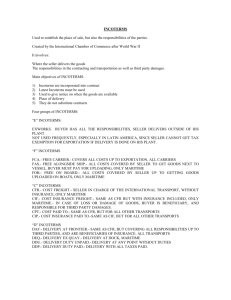
T N I A N ER O M C M L ERCIA A N O I T L TE RM S INCOTERMS Classification of the 11 Incoterms® 2010 rules 1 EXW 6 DAP 10 CFR 2 FCA 7 DDP 11 CIF 3 CPT 8 FAS 4 CIP 9 FOB 5 DAT Introduction Incoterms is a set of international rules for the interpretation of the most commonly used trade terms. Applying Incoterms to sale and purchase contracts makes global trade easier and helps partners in different countries understand one another. The parties to the transaction select the Incoterms, which determine who pays the cost of each transportation segment, who is responsible for loading and unloading of goods, and who bears the risk of loss at any given point during an international shipment. The ICC first published this set of international rules in 1936 as “INCOTERMS 1936.” Incoterms are amended every 10 years. The 11 Incoterms® 2010 rules are presented in two distinct classes: RULES FOR ANY MODE OR MODES OF TRANSPORT: 1. EXW EX WORKS The buyer is responsible for all transportation costs, duties, and insurance, and accepts risk of loss of goods immediately after the goods are purchased and placed outside the factory door. 2. FCA FREE CARRIER The seller, or exporter, clears the goods for export and delivers them to the carrier and place specified by the buyer. 3. CPT CARRIAGE PAID TO The seller, or exporter, clears the goods for export, delivers them to the carrier, and is responsible for carriage costs to the named place of destination. 4. CIP CARRIAGE AND INSURANCE PAID TO The seller transports the goods to the port of export, clears customs, and delivers them to the carrier. From that point, risk of loss shifts to the buyer. 5. DAT DELIVERED AT TERMINAL The seller delivering the goods, once unloaded from the arriving means of transport. Goods are placed at the disposal of the buyer at the named terminal, at the named port or place of destination. 6. DAP DELIVERED AT PLACE The seller is responsible for the costs of packing goods as well as for arranging the delivery of the cargo at a place agreed with the buyer. The seller needs to ensure the goods will arrive safely at the final destination or otherwise, he will need to support costs for any sort of delays. 7. DDP DELIVERED DUTY PAID The seller, or exporter, is responsible for all costs involved in delivering the goods to a named place of destination and for clearing customs in the country of import. RULES FOR SEA AND INLAND WATERWAY TRANSPORT: 8. FAS FREE ALONGSIDE SHIP Sellers transport the goods from their place of business, clear the goods for export, and place them alongside the vessel at the port of export, where the risk of loss shifts to the buyer. The buyer is responsible for loading the goods onto the vessel, unless specified otherwise, and for paying all costs involved in shipping goods to the final destination. 9. FOB FREE ON BOARD 11. CIF COST INSURANCE AND FREIGHT The seller, or exporter, is responsible for delivering the goods from its place of business and loading them onto the vessel at the port of export, as well as clearing customs in the country of export. The seller, or exporter, is responsible for delivering the goods onto the vessel of transport and clearing customs in the country of export. The exporter also is responsible for purchasing insurance, with the buyer (importer) 10. CFR COST AND FREIGHT named as the beneficiary. The seller, or exporter, is responsible for clearing the goods for export, delivering the goods past the ships rail at the port of shipment, and paying international freight charges. The buyer assumes risk of loss once the goods cross the ship’s rail, and must purchase insurance, unload the goods, clear customs, and pay for transport to deliver the goods to their final destination. As of 2020 INCOTERMS DAT IS NOW DPU DPU (Delivery Place Unloaded) replaces DAT (delivery at Terminal) in the incoterms 2020. This is the only newly named term in the guide, which is erectly exactly the same, with clearer language and rules. The obligations of the Buyer and Seller are the same in both DP and DAT. NEW INSURANCE RULES FOR CIF AND CIP There are changes to Cost Insurance and Freight (CIF) and Carriage and Insurance Paid To (CIP), which are the only Incoterms that define who is to pay for insurance. For both CIF and CIP, the insurance is to be paid by the seller. Now, the seller has to purchase insurance for the shipment to at least 110% of the value of the goods. As of 2020 INCOTERMS FCA OPTION FOR ONBOARD NOTATION FOR BILL OF LADING GREATER CLARITY ON WHO IS RESPONSIBLE FOR WHAT The new 2020 rules make it clear the buyer should instruct the carrier or its agent to release the Bill of Lading(B/L) on the seller’s behalf. The B/L will have the annotation of the on-board, or Aboard that states, the goods have been loaded on the vessel. The Bill of Lading is one of the most common documents used to release payment if you pay by a letter of credit. The new rules were rewritten to use less technical jargon and to be easier to understand. It tried to make the rules as clear as possible while still being legally enforceable in a multinational legal contract. As of 2020 INCOTERMS DIY TRANSPORT OPTIONS NEW SECURITY REQUIREMENTS For the first time, the new incoterms now recognize that both buyers and sellers can transport the goods using their vehicles. This means they recognize buyers can now pick up god using their vehicle from a port or terminal destination. The new rules make it clear which party is liable at two key points: Transport from the country of origin and customs clearance into the destination country. For the transport out of the country, the seller is to assume liability for CPT, CFR, CIP, CIF, DAP, DPU, and DDP, while the buyer is liable if it is EXW, FCA, FAS, and FOB. Customs clearance falls on the party defined in the terms. THANK YOU!




